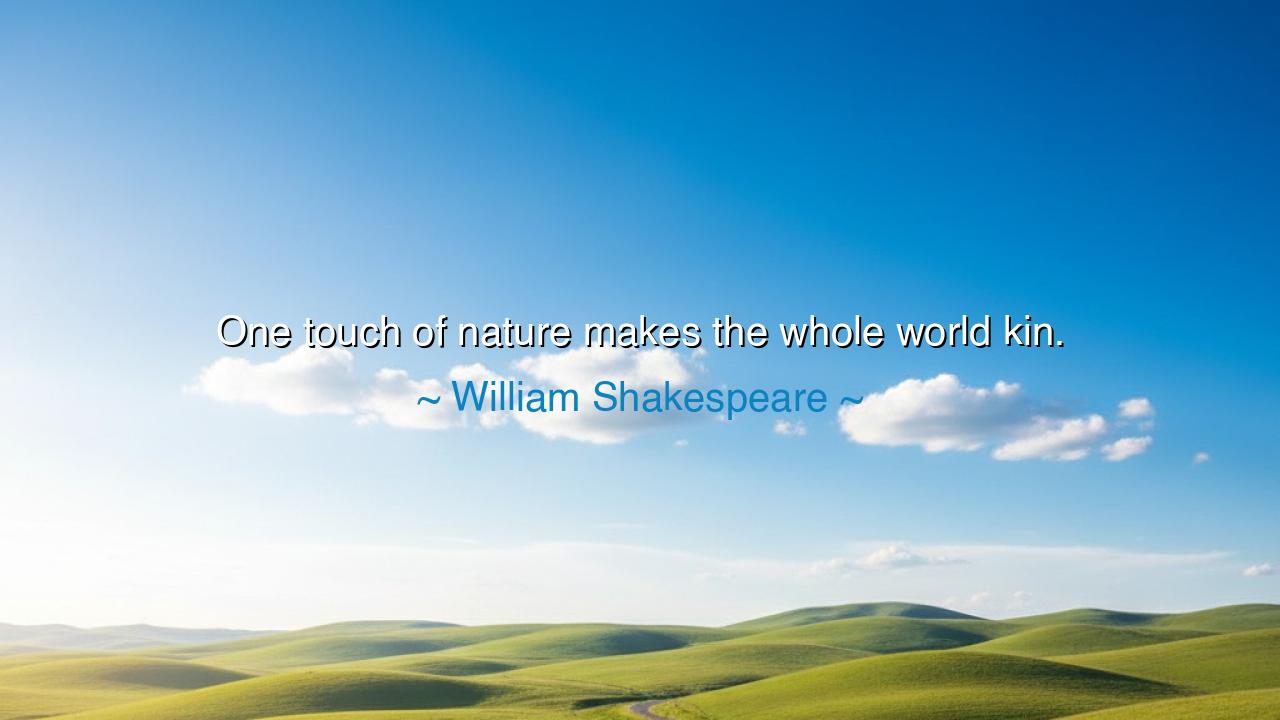
One touch of nature makes the whole world kin.






Hear now the immortal words of William Shakespeare, who declared: “One touch of nature makes the whole world kin.” In this simple line lies a fountain of wisdom, a truth that binds every soul under heaven. For Shakespeare saw what the sages of old had always known—that the pulse of nature beats alike in every living being, and that in its touch we recognize ourselves in one another. The mountains may divide, the tongues may differ, the banners of nations may clash, but when the wind stirs the grass or the stars emerge in silence, all men and women feel the same wonder, the same fragility, the same kinship.
The origin of this saying is drawn from the play Troilus and Cressida, where the poet laments the fickleness of men, who turn from greatness to weakness in but a moment. Yet, in this lament, a deeper truth emerges: the touch of nature—whether it be human weakness, shared emotion, or the call of the earth itself—reminds us that we are all bound together. In our shared mortality, in our capacity to love, to fail, to weep, to rejoice, we discover that none of us stands apart. The world is kin, for all partake of the same dust, and all are warmed by the same sun.
Consider the story of the Christmas Truce of 1914. In the midst of the Great War, when blood stained the fields of Europe, soldiers on both sides heard carols drifting across the trenches on Christmas Eve. Moved by this touch of nature—the ancient longing for peace, for home, for brotherhood—they laid down their arms. Enemies crossed no-man’s-land, shook hands, shared bread, and even played games of football. For a moment, the whole world was kin, as Shakespeare foretold, united not by treaties or kings, but by the simple human yearning for life and connection.
This is the power of nature: it strips away the illusions of separation. A mother in Rome weeps for her child as surely as a mother in Jerusalem. A man in China gazes at the moon and feels the same stillness as a man in Africa. A storm terrifies equally, a song uplifts equally, a sunrise inspires equally. When we touch these primal elements of existence, we find that our divisions are shallow, and our kinship is deep.
But let us not mistake this teaching for mere sentiment. It is a call to courage. For if the touch of nature binds us, then to harm another is to wound oneself, and to care for another is to strengthen the whole. Injustice, hatred, and cruelty arise from forgetting this kinship. The tyrant believes himself apart, the conqueror imagines himself greater—but both are undone when they remember they too bleed, they too age, they too die. To embrace the touch of nature is to embrace humility, compassion, and unity.
The meaning, then, is clear: Shakespeare’s words remind us that greatness is not in standing above others, but in recognizing the shared flame of life within them. The whole world is kin, and every act of kindness strengthens the family of creation. The divisions of race, creed, and nation are but shadows; the truth is the kinship of life itself.
Practical wisdom flows from this truth: seek out the touch of nature daily. Walk beneath the sky and remember you breathe the same air as all who live. Listen when another weeps, and remember their pain is kin to your own. Celebrate when another rejoices, for their joy flows into your joy. Act with mercy, patience, and generosity, for in so doing you honor the bond that unites the world.
Thus, let Shakespeare’s teaching echo in your heart: “One touch of nature makes the whole world kin.” Live with reverence for this kinship, and you shall walk not as a stranger in the world, but as a brother, a sister, a child among children, bound to all by the eternal thread of life.






AAdministratorAdministrator
Welcome, honored guests. Please leave a comment, we will respond soon